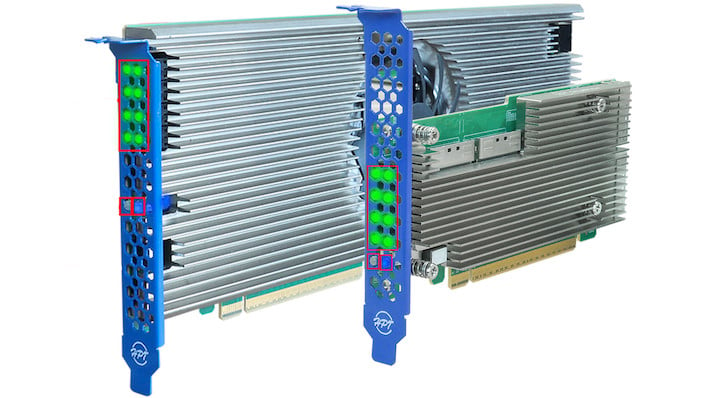
There are two different classes of products that HighPoint is announcing today, each with two models. The “lower-but-still-quite-fancy” tier includes the Rocket 1608A and Rocket 1628A full-height add-in cards. These are standard PCIe 5.0 x16 expansion cards with a powerful PCIe 5.0 switch that allows them to host eight PCIe 5.0 x4 SSDs off of a single slot.


Meanwhile, the Rocket 1628A has a smaller, passive heatsink and doesn’t require external power. That’s because it doesn’t host the drives on the card; instead, it has four MCIO ports, also known as “SFF-1016”. These connectors are basically ports that carry PCIe 5.0 x8 on a wire not unlike the previous U.2 form factor. Indeed, you can use adapter cables to connect two PCIe x4 U.2 devices to a single MCIO connector, giving these cards the ability to handle eight drives as well. Altenratively, you can wire up this card to four-drive backplanes giving it the ability to run 32 drives at once.

The higher-end models are the Rocket 7608A and Rocket 7628A. In physical form, these cards are nearly identical to their cheaper cousins, but they carry a key feature missing on those cards: RAID support. The Rocket 7600 series have the same capabilities as the 1600 series above, but they also have the ability to configure connected drives into as many as four separate RAID arrays using RAID 0, RAID 1, or RAID 10 topologies. They also include hardware Secure Boot support as well as the ability to hot-plug and hot-swap NVMe devices.

All of this hardware is expected to be available in Q3 of this year, but you can pre-order them now—you’d just better bring the company checkbook. The Rocket 1600 series goes for $1,499 USD whether you want M.2 or MCIO connectors, while the Rocket 7600 series will run you $1,999 apiece. So saying, they’re not cheap, but they might just be the easiest way to pile a ton of PCIe storage into your custom-built server.